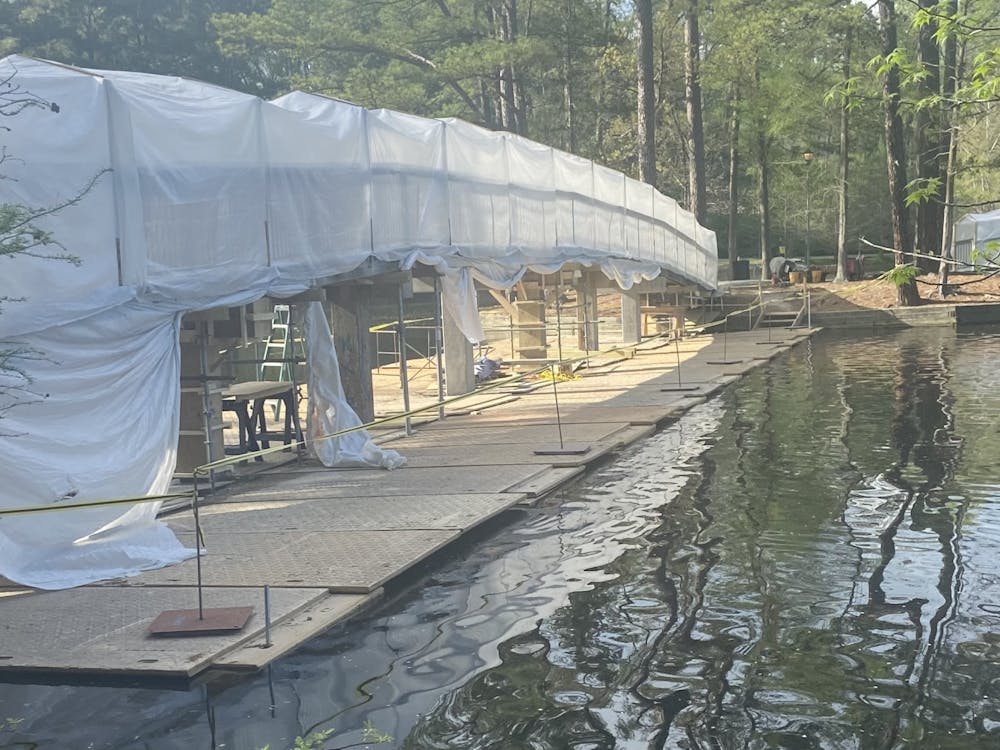Though undergraduate and graduate virtual courses are filling up with students from around the world, undergraduate programs at the University of Richmond are not looking to follow the online education trend any time soon.
Of Richmond's five schools of study, the School of Professional and Continuing Studies (SPCS) currently offers the most online classes and has promoted online learning for the past 10 years. Dean James Narduzzi said the school offered classes for credit, degrees and non-credit classes in an online format.
"Going forward, online courses will continue to be a part of what we do in SPCS, especially in the non-credit arena and in summer school," Narduzzi said. "Our current strategic plan, however, shifts our focus from expanding our footprint outside our region to better serving our current population of non-traditional students in central Va."
The SPCS staff currently offers online courses in various areas of study. It partners with online providers to increase the flexibility and breadth of its course offerings, according to the school's website. Each partner offers courses in a different area of study, with JER Online offering 650 certificates in more than 45 different course areas.
The Robins School of Business staff currently does not offer online classes, but Dean Nancy Bagranoff said that online tools had been incorporated into classrooms.
"I think that our approach to technology is, 'How can we use information technology to enhance what we do or to enhance the in-class experience?'" Bagranoff said. "I don't know that we won't at some time create some online pieces of classes -- and it's possible that there could be a class. But, there wouldn't ever be a class in my imagination that would be online that would replace what we do in the classroom here."
One example of how the Robins School is using the web, Bagranoff said, is through a marketing math module, created by marketing professor Randy Raggio. Raggio began using the module in his introductory marketing class, and it is now used in all introductory marketing classes. The module includes videos, Powerpoints and extra problems and solutions.
"I think that it's a wonderful new world that we have to explore, with a lot that we can learn and learn in years to come," Bagranoff said. "I think that graduate education in particular may be a good place for it because graduate students may be motivated in a different way."
Classes in the School of Arts and Sciences also use online classroom tools such as Blackboard and Bannerweb, but Dean Kathleen Skerrett said the school was not looking to replace its traditional style of classroom learning.
"The School of Arts and Sciences does not offer online classes," Skerrett said. "While we do use electronic communications or instructional support if a faculty member finds that it serves student learning, we have no plans to move to online courses."
Both Narduzzi and Bagranoff said that a "hybrid" model -- a class that met in a traditional way, but used the web for educational purposes -- might best serve Richmond students' needs and expectations.
"I suspect that blended courses will continue to expand, adding scheduling flexibility to enhance the classroom experience," Narduzzi said.
Enjoy what you're reading?
Signup for our newsletter
"As you might imagine, flexibility is a key condition for adult students who are juggling their studies with jobs, families and community commitments."
According to a report released by the Sloan Consortium in 2012, the number of students taking at least one online course had surpassed 6.7 million. Narduzzi said that Richmond administrators were currently "reviewing how best to use technology to enhance the residential college experience." But, those conversations are ongoing, Narduzzi said, and it would be "premature to speculate" on the future of online classes at Richmond.
"I think that's the advantage of an education at the University of Richmond," Bagranoff said. "You're in a small classroom setting with your teacher and students that are trying to learn at the same pace you are, and the exchange that takes place in that classroom is hard to replicate in a virtual world."
Contact reporter Anika Kempe at anika.kempe@richmond.edu
Support independent student media
You can make a tax-deductible donation by clicking the button below, which takes you to our secure PayPal account. The page is set up to receive contributions in whatever amount you designate. We look forward to using the money we raise to further our mission of providing honest and accurate information to students, faculty, staff, alumni and others in the general public.
Donate Now


